Deus Ex 20th Anniversary: Programmer Scott Martin talks about working on the PC gaming masterpiece
How Deus Ex chased its "impossibly ambitious" vision and changed gaming forever

Sign up for breaking news, reviews, opinion, top tech deals, and more.
You are now subscribed
Your newsletter sign-up was successful
On June 23, 2000, the team at Ion Storm Austin released Deus Ex into the world and held their breath for about a month.
Weeks earlier, Ion Storm's Dallas office made gaming history with Daikatana, widely considered one of PC gaming's biggest failures, and Deus Ex was thrown into the middle of a raging firestorm that it had nothing to do with.
Years of development hell, atrocious marketing, and management dysfunction in Dallas had come to a head just as the monthly gaming magazine print cycle caught up to Daikatana's release. They were all full of reviews of one of the most hyped games in history of PC games – few of them were kind, and none of them were good.
Daikatana promised to be the greatest first-person shooter ever made, with advanced, realistic AI, loads of guns, and the kind of story-driven narrative that was rarely seen outside of a JRPG. Its failure to deliver on the promises it made is a cautionary tale for the industry and one of Daikatana's major failings was that it tried to do so many things that it didn't do any of them well.
So following up Daikatana a month later with an overly ambitious game from an Ion Storm office down the road that claimed to be unlike anything gamers had ever experienced before was chum for the sharks in the gaming press and gaming audience at large. Deus Ex was making a bold claim at the worst possible time.
Not everyone was rattled by it, though. Scott Martin, one of the only three programmers tasked with coding the entire game using the very first Unreal Engine, sums up the confidence the Deus Ex team had in the game's release: "I think we all knew what we were creating."
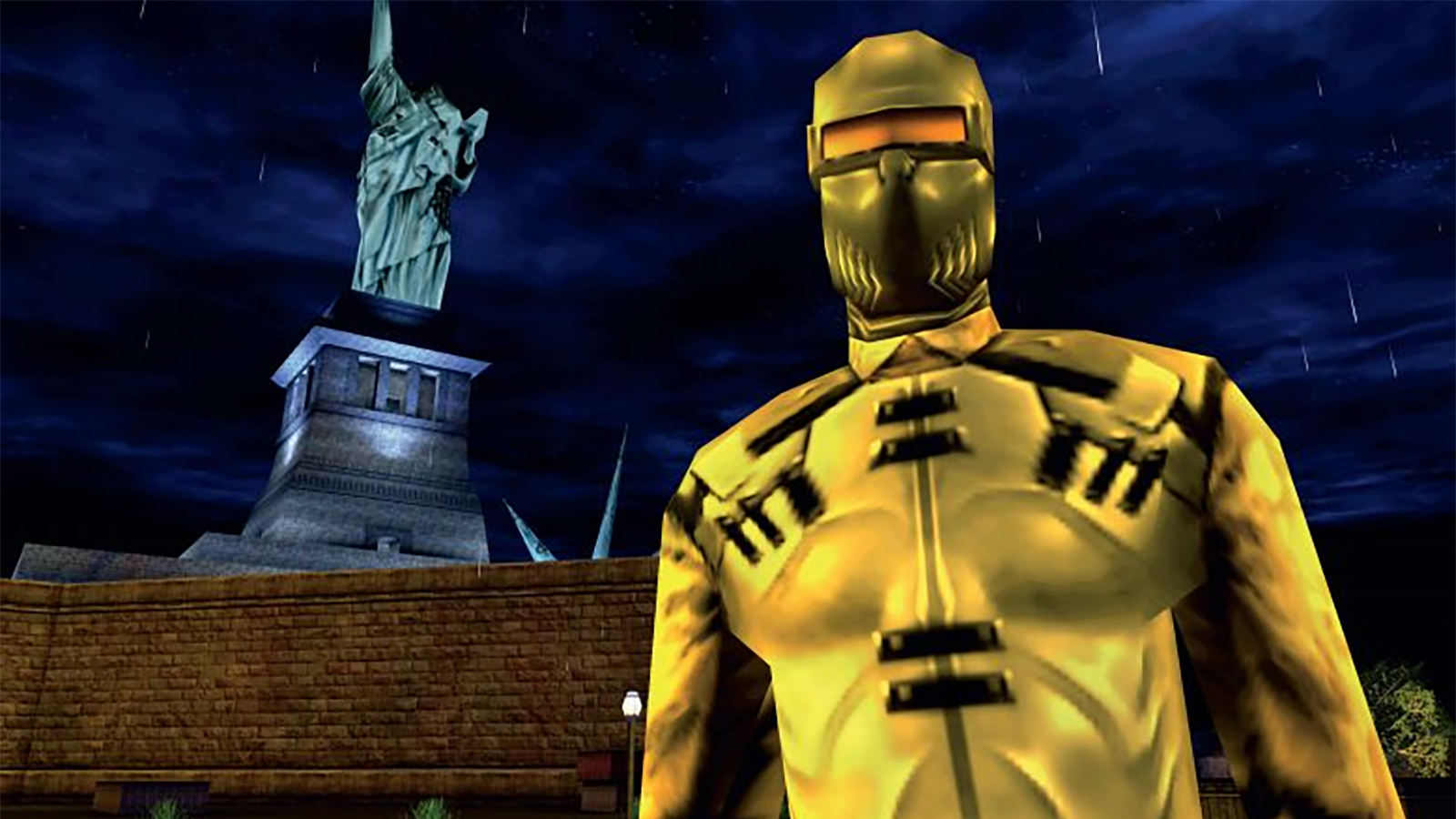
Envisioning the paranoid, shadowy, and mostly impossible world of Deus Ex
"We had a really talented and driven team," Martin recalled. "I was lured away from a job I loved to work on [Deus Ex], and I did it mainly on the strength of the original design document, which was almost impossibly ambitious."
Sign up for breaking news, reviews, opinion, top tech deals, and more.
Impossibly ambitious is one way of putting it. While branching conversation trees or deciding between sneaking past enemies or getting into a firefight are basic game design features today, putting all of these elements into a single game in 2000 was madness.
Deus Ex was a near-future cyberpunk dystopia that blended the conspiratorial world of The X-Files with the globe-trotting adventure of a James Bond film with the visual stylings of The Matrix. Toss in a heavy dash of transhumanism, artificial intelligence, and millennialist anxiety (we'd all just gone through the lunacy of Y2K, after all) and it felt like someone had set a curiously-morbid toddler loose to create a game and they just started throwing in everything they happened to like without concerning themselves how any of it would fit together.
More than just the world they wanted to build, there was the audacity of the gameplay. It was a first-person shooter that was also an RPG and an adventure game that came as close as you could really get to the feel of an "open-world" in 2000. Today, it's not hard to imagine making this kind of game, but when development began in the late 1990s, this was faster-than-light levels of ambition.
Spector wrote up a postmortem for Deus Ex's development several months after the game's release, and by today's standards, it's a jarring read. When Deus Ex pushed against the boundaries of the available technology, that meant requiring players to have 16MB of RAM installed – not L2 cache, RAM – and something called a graphics accelerator. In 2000, this actually threatened to put the game out of reach for a good number of people and they hadn't even written a single line of code.
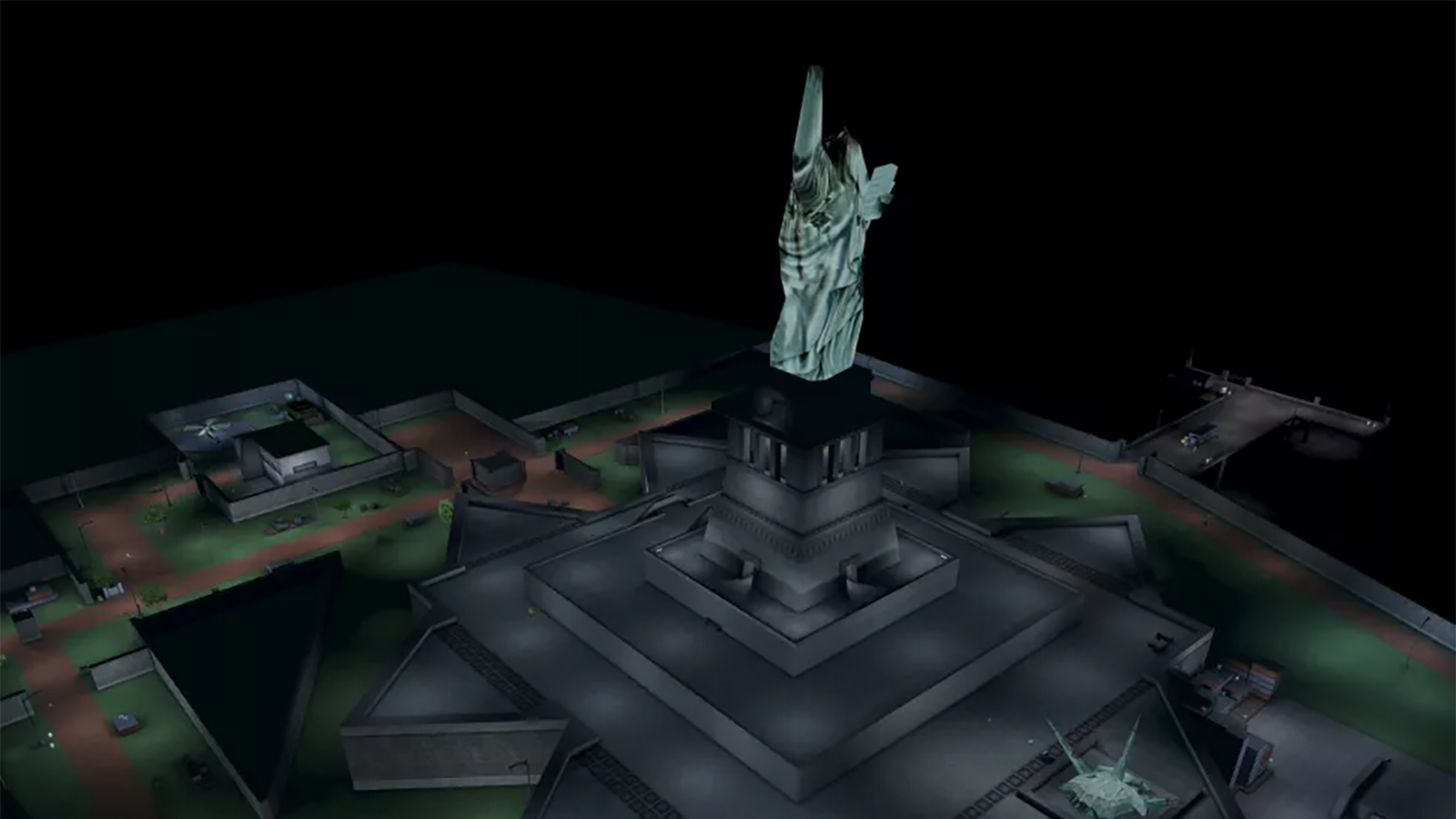
The game's fully-voiced dialogue wasn't novel, by any means, but with more than 200 NPCs and a heavy focus on its narrative story and allowing players to progress through the game by making correct conversation choices rather than just shooting everything, the game chewed up hard drive space that was still a premium commodity in 2000.
The world that Warren Spector and his team at Ion Storm Austin wanted to build was inconceivable from a technological perspective. But that was the ambition of Deus Ex, even if no one really knew how they could actually do it. All they could really do was rely on their experience to guide their work going forward.
"A big chunk of the development team came from the Looking Glass and Origin Systems tradition," Martin said. "Ultima, in particular, was famous for dumping a million tiny details into the game world. Even those of us who didn't work for those companies before we joined Ion Storm loved that kitchen-sink approach and tried to take the same approach with Deus Ex."
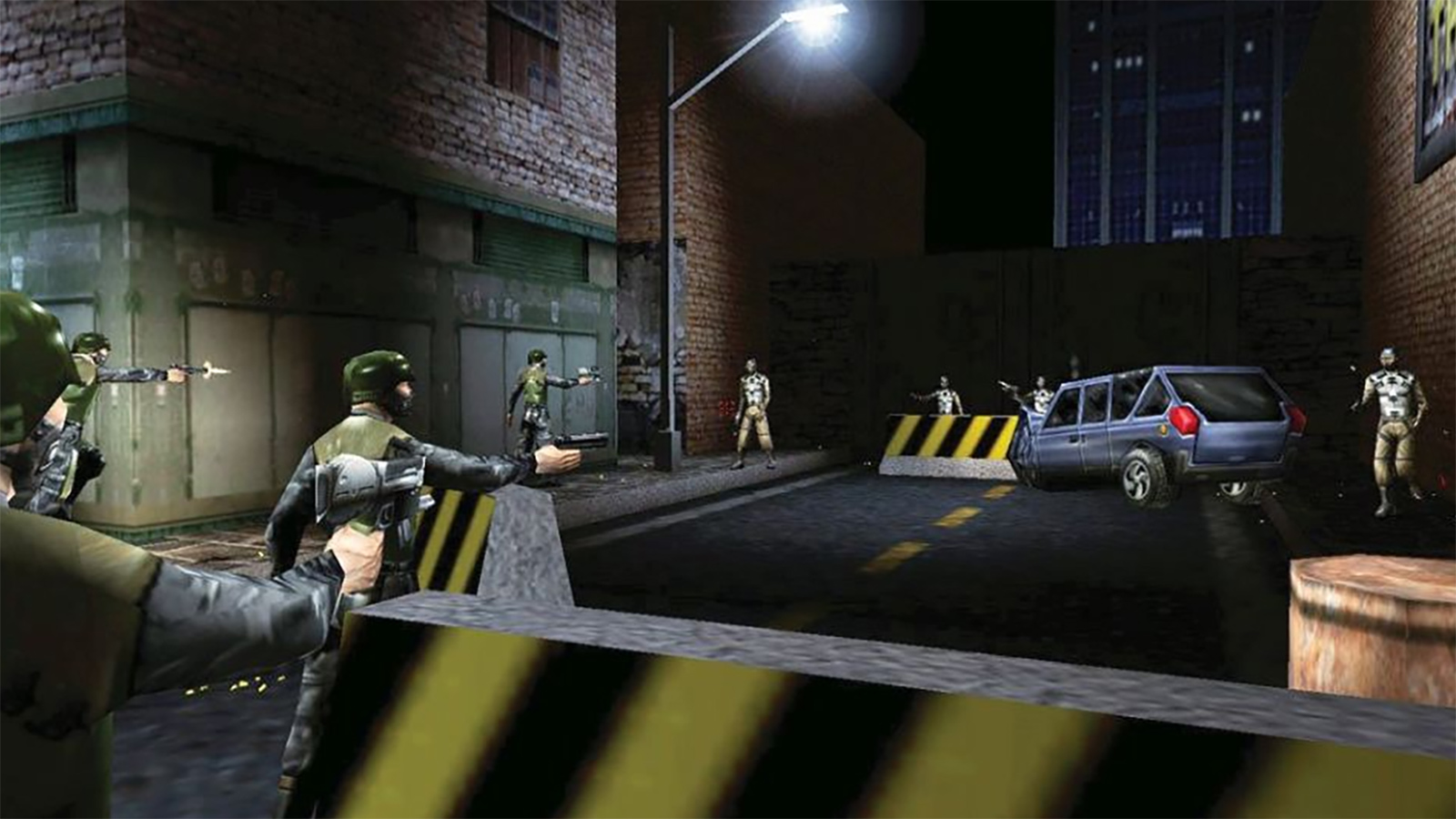
We had this idea early on that we wanted things like rats and pigeons in the game, to create an air of realism, even though they didn't have an effect on gameplay.
Scott Martin
For Martin, whose responsibilities included building a user interface library for the Unreal engine from scratch and designing the behavioral AI for the game's NPCs, this kitchen-sink approach translated into making the NPC denizens of their game world behave in a radically new way.
"At the time, [Unreal Engine] had a purely shooter-based AI," he explained, "which could handle movement towards targets but not more subtle NPC behavior. I added a lot of new AI states to the code, especially for non-hostile NPCs, and gave them the ability to wander, patrol, follow the player, sit in chairs, etc."
An NPC walking across the room to sit in a chair for no narrative reason chewed up processing and graphics resources, so if an NPC wasn't used in a scripted scene, developers would just have them there until you talked to them. By introducing these NPC behaviors, it was a much more living world than any game that had come before it, including 1998's Half-Life.
This extended even further than just people. Animals are NPCs too, so Martin also developed the AI behavior for the game's ambient critters, like New York City pigeons or the rats in the Paris catacombs. Spector's design document listed a Pentium 133 processor as the target hardware requirement, so spending scarce processing cycles on a developed AI for background critters was an unorthodox move to say the least.
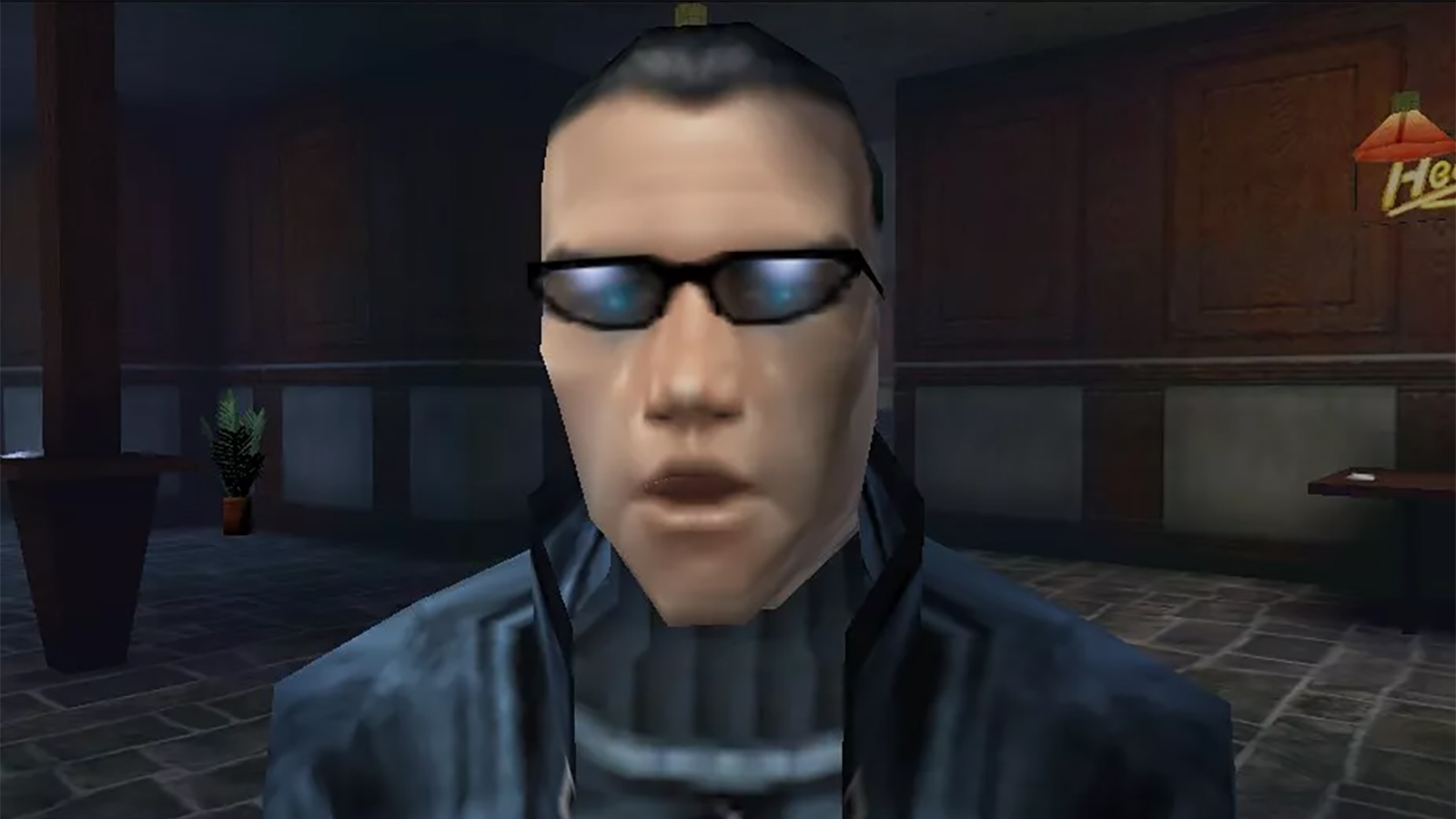
How Deus Ex made player choice consequential
The game has its hero, JC Denton, traveling the world to exotic locales to uncover a conspiracy that touches on everything from secret government population control schemes to a runaway AI that may or may not end up controlling the world from behind the scenes by game's end.
Whether it does or not is entirely dependent on the choices that you, the player, ultimately make. Not only was player choice a guiding principle for Deus Ex, more importantly, those choices were consequential, not just decorative.
"One of the most important design decisions we made was that choices have consequences," Martin said, "that the user's actions should affect the game in both large and small ways."
"We wanted players to be able to make choices and then react to the consequences of those choices, following real-world consequences as closely as possible...within some pretty severe limitations."
"We didn't have a lot of CPU power or memory to work with back then," he conceded.
Beyond the narrative consequences of the player's actions, there were much more immediate and visceral responses to player behavior. Martin says he was especially proud of the way NPC behavior reacted to visual and auditory cues from the environment and not just simple line-of-sight reactions – a level of AI sophistication that was only starting to emerge in 2000.
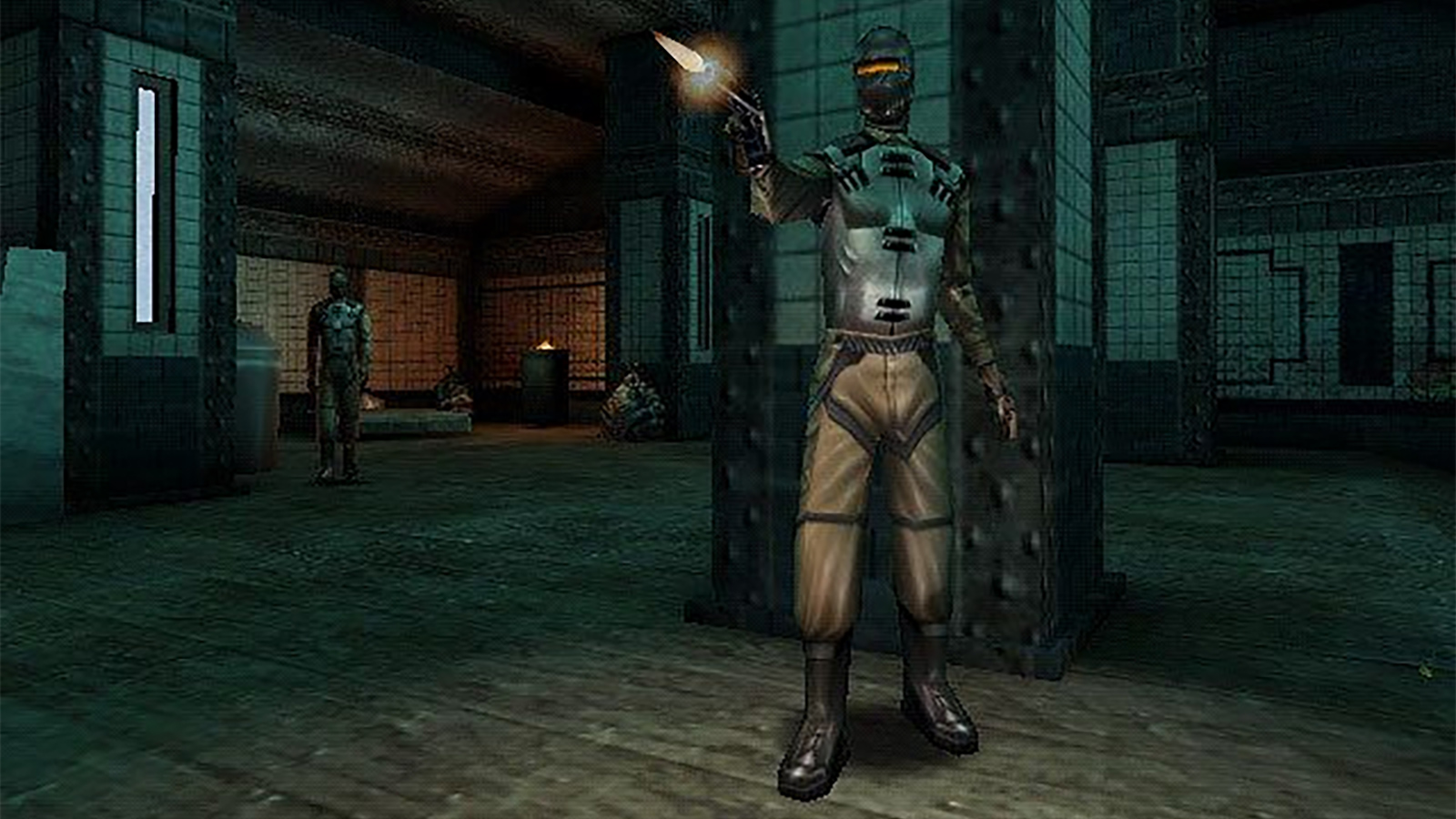
One of the most important design decisions we made was that choices have consequences, that the user's actions should affect the game in both large and small ways.
Scott Martin
Martin points to a playtest he conducted during the game's development to explain the kinds of boundary-pushing he and the Ion Storm Austin team were doing: "I was standing on the Statue of Liberty and shot at a distant terrorist with a sniper rifle. The shell casing dropped several stories and landed next to another terrorist, who heard the sound."
"He was immediately alerted, turned towards the casing, and then started looking around for me. I still remember my surprise decades later. We actually had to limit the seeing and hearing radii of NPCs because the game became too hard otherwise!"
Limited though it may have been, that response from enemy AI forced a radical change in how you played the game. Shooting an enemy with a pistol could alert other enemies you didn't know were there to your location, who would then come charging in, guns blazing, and overwhelm you.
Auto-saving and checkpoints were still a few years away, so if you hadn't saved your game in a while, one wrong move could send you back to where you were hours beforehand. And that was after Martin nerfed the game's AI.
"[Deus Ex] had to give the player the ability to recover from mistakes," he said, "so NPCs had to eventually 'forget' that some dude in a trenchcoat was detonating explosive barrels in their headquarters."
A silenced pistol, on the other hand, changed the calculation entirely, so before long, the player would be managing an inventory of several weapons and tools like something out of Diablo just to ensure you always had options. It turned out to be the kind of feature that many non-RPG players never even realized they wanted until Deus Ex gave it to them.
The Deus Ex that might have been
Many of the specifics of the game changed massively between conception and completion, but Warren's [Deus Ex] design mantra (refined by Harvey Smith and others) survived the entire process, and everybody was committed to following it.
Scott Martin
For any creator, there's going to be some "If only we had more..." kinds of reflections about their creation. Art is never finished, only abandoned, as the saying goes and video games are no different.
"I wish we'd had about three more months to polish the game," Martin said of one of PC gaming's most critically acclaimed titles. "For understandable reasons, we were under tremendous pressure from our publisher to ship Deus Ex. Ion Storm's first two titles (Dominion: Storm over Gift 3 and Daikatana) shipped before us and hadn't sold well. We were concerned that Eidos would shut down the studio if [Deus Ex] didn't earn back the investment they had put into the game."
The realities of a production schedule necessarily lead to hard choices about what to keep and what to cut away. With Deus Ex's lofty ambitions, this meant scaling back some of the game's most ambitious ideas, like JC Denton ending up on a mission in the White House and his liberating 2,000 civilian prisoners held under UN guard at a FEMA concentration camp during an invasion of Texas by the Mexican military.
One of the more interesting cuts from the game involved the setting for Deus Ex's end game events, which originally took place on a space station. Martin found this cut particularly difficult to take.
"For me, the biggest one was the space station. I was looking forward to coding combat and movement for a low-gravity environment, so I was crushed when we decided to cut the space station and the moon base. But," he said, "it was ultimately for the best. In hindsight, if we'd kept them, I think we would have lost some of the real-world grounding that made the game special."
I was looking forward to coding combat and movement for a low-gravity environment, so I was crushed when we decided to cut the space station and the moon base.
Scott Martin
Martin wasn't the only one who took a special interest in the Deus Ex space station that never was. Spector produced the original System Shock at Looking Glass Technologies and Origin Systems in 1994. He was convinced that that industry shoggoth Electronic Arts (which acquired Origin Systems in 1992), would never greenlight a System Shock sequel, so he wanted to incorporate elements of that world into Deus Ex.
"In the final levels of Deus Ex," Martin recalled, "we were going to drop little hints that the space station was actually Citadel Station, and [Deus Ex's] rogue AI was a precursor to SHODAN, making Deus Ex an unofficial prequel to System Shock."
"To our surprise, early in development, we learned that Irrational Games had acquired the rights to System Shock and was making a sequel, so we scrapped the idea."

Delivering on the promise of Deus Ex
Despite the inevitable challenges of a creative process, the grudging revisions and concessions to reality, often the hardest thing to do is to simply get a team of 20 or so people to collaborate toward a single shared vision.
"Warren had learned a lot from the development of immersive sims like Ultima Underworld and System Shock," Martin said. "Many of the specifics of the game changed massively between conception and completion, but Warren's [Deus Ex] design mantra (refined by Harvey Smith and others) survived the entire process, and everybody was committed to following it."
The Ion Storm team was heavily invested in the game's success and not just for financial reasons. As a small team of game developers, there was a lot of ownership over the final product, Martin said.
"There was a lot of camaraderie, and each individual developer could make a larger contribution - and everybody on the Deus Ex team made positive contributions. When you 'own' more of the final product, I think it inspires you to put more time and effort into making your piece of it as good as possible."
After devoting three years of their lives to a project as ambitious as Deus Ex, the Ion Storm Austin team could be forgiven if any of them felt any dread about releasing their game so soon after Daikatana's failure. If he did, Martin doesn't let on, his only ill word against the game being the understated observation that the game "hadn't sold well."
If anyone else felt anxious, it was short-lived. The critical reception of Deus Ex was swift and ecstatic. PC Gamer gave it a 94 out of 100, while Eurogamer and GamePro gave the game perfect scores. GamesRadar did as well, calling the game "near-perfect in every conceivable way."
Working for Warren Spector remains one of the high points of my entire career.
Scott Martin
As for Ion Storm, Eidos shut the studio's Dallas office in 2005 but kept the Austin office open for a time. The franchise spawned three more games in the series over the next two decades, some better than others, but none as groundbreaking as the original.
"It really was the game of my dreams," Martin said. "I worked on some fun games after Deus Ex, but none of them captured my heart the way DX did."
After Deus Ex's 2004 sequel, Deus Ex: Invisible War, the series was turned over to Eidos Montreal, who produced 2011's Deus Ex: Human Revolution, a game many fans of the series celebrated as a return to the series' original vision. Martin said that Eidos Montreal has definitely done right by the series.
"I spent a little time with the Eidos Montreal team when they first started developing Human Revolution, so I knew the series was in good hands. Overall, I think Eidos Montreal took it in a great direction. They kept the atmosphere of the original game, but made it their own."
Reflecting on the original Deus Ex's revered place in PC gaming history, Martin keeps it humble. "I feel honored and privileged to have worked on the game," he said, "and happy that so many people still remember it fondly after all this time!"
About his Ion Storm colleagues, Martin said, "I miss them all. We sometimes acted like a huge family of grumpy siblings, but it was a great team. Working for Warren Spector remains one of the high points of my entire career."
- Here are the best PC games

John (He/Him) is the Components Editor here at TechRadar and he is also a programmer, gamer, activist, and Brooklyn College alum currently living in Brooklyn, NY.
Named by the CTA as a CES 2020 Media Trailblazer for his science and technology reporting, John specializes in all areas of computer science, including industry news, hardware reviews, PC gaming, as well as general science writing and the social impact of the tech industry.
You can find him online on Bluesky @johnloeffler.bsky.social